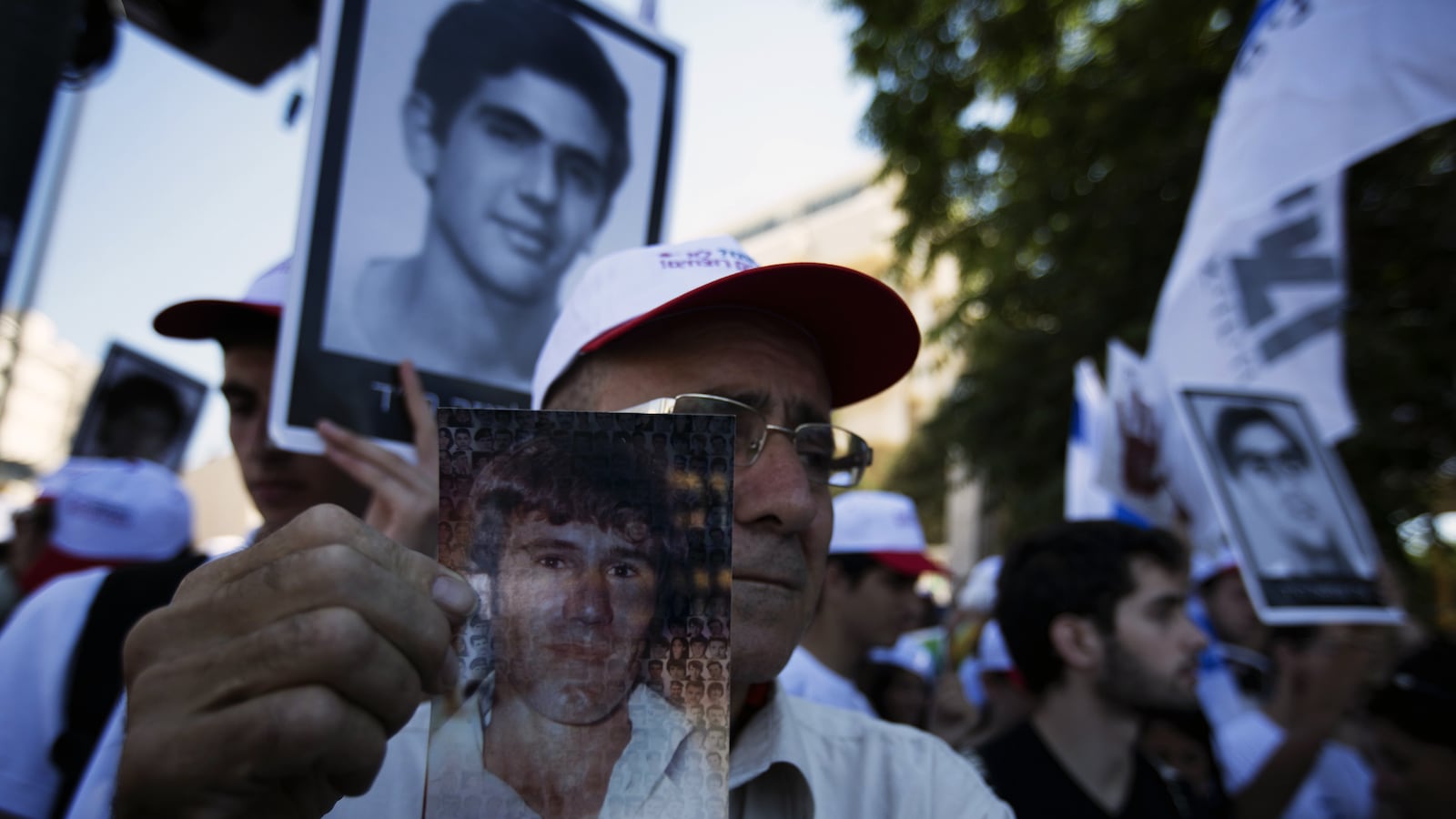The protest against the prisoner release contained some powerful images: black and white faces on placards that displayed both victims and their soon-to-be-released victimizers, and bloody hands—reminiscent of the famous photograph of Aziz Salha after the 2000 lynching of two IDF reservists in Ramallah—were everywhere. The organizers published the cell phone numbers of Knesset members who were still deliberating, urging protestors to text them and try to sway their votes. The slogan, plastered all over Jerusalem, was hard to argue with: "Have we gone crazy? Don't release murders." Putting arguments over whether or not this objectively a good idea aside, this is likely the first in a series of right-wing spin campaigns as negotiations begin. This prisoner release, and any future Israeli concessions in negotiations (major or minor), hold great political utility for both Prime Minister Benjamin Netanyahu and his coalition partner, Jewish Home chairman Naftali Bennett. The most obvious utility is that it gives Netanyahu a free pass on freezing settlements.

To be fair, the angst around the prisoner release isn't just rightist propaganda—it's also actually frustrating to many. But it is worth remembering that not that long ago, a prisoner release and a settlement freeze were coupled as preconditions for negotiations. The fulfillment of only one (the one already promised by Ehud Olmert, at that), provides Netanyahu with excellent political positioning. It allows him to maintain his pro-settlement policies, pay lip service to an American-brokered agreement, and places him in an ideal spot in relation to to Bennett, who will continue building and putting on a grim face.
First, a closer look at Netanyahu. In exchange for this prisoner release, approved by 13 members of the Cabinet (rejected by seven with two more abstentions), Israel gets an open door for renewed talks. In other words, Netanyahu gets to make a clear public move on the international stage towards a revamped status quo—one in which negotiations can be held endlessly. It is noteworthy, too, that an urgency has entered the Israeli discourse in the wake of the European Union released their 2014 guidelines for investment, a move which made their policy of not investing across the Green Line official. For Netanyahu, negotiations are a kind of outlet for this urgency: There will be good—or at least better—PR and, moreover, a chance to show his public that the world isn't going to turn Israel into a pariah tomorrow. This "status quo 2.0" is just a fancy new paint job worth the price of 104 pre-Oslo prisoners over nine months.
In some ways, this can be read out of of what Netanyahu told his cabinet. First, that "every Palestinian provocation will cause the prisoner release process to halt," an indication that he's hesitant to actually reach a final deal at the end of the day. Second, that "resuming peace talks is important to Israel, taking into account the current regional situation"—in other words, our international standing is very much on the ropes. Finally, when facing recalcitrant Likud ministers, he argued that there is "no alternative" to renewing the process—an argument that convinced, at the very least, MK Gidon Sa'ar, a man who has been exploring alternatives to a Palestinian state for years. And while that might sound like a good thing, "no alternative to renewing the peace process" doesn't mean that there is "no alternative to peace with the Palestinians," or even "no alternative to a Palestinian state." It means that the time has come to restart our vague processing, nothing more.
Secondly, Bennett. He made an appearance at the protest yesterday, along with at least three other Jewish Home MKs (Ayelet Shaked, Orit Struk, and Uri Ariel). This is no reason to think Bennet is interested in breaking up the coalition. It is simply not in his best interest. What is in his best interest is to play his part: the face of dismay. Every move that might appear to encourage Palestinian statehood, beginning with the prisoner release, improves his position. Each will warrant another campaign culminating in protest. Each will be organized by the right-wing movements that he (and Gidon Sa'ar) made possible, MyIsrael and Im Tirtzu. He will only break with the coalition at the eleventh hour—an hour that likely doesn't display on Netanyahu's watch. And, should that hour fail to come and negotiations flop (and violence ensues), Bennett gets to say, "I told you so," and blame the Left. Until then, as Jewish Home's Ayelet Shaked said yesterday in the Knesset, "We build and they kill. Everyone does what he knows and is familiar with."






